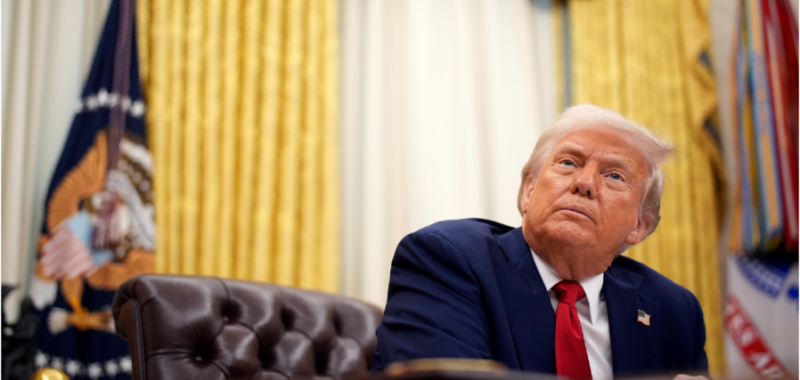
President Trump’s telephone calls with Vladimir Putin hearken back to Franklin Roosevelt’s way of handling Joseph Stalin.
In January 1943, Roosevelt had an opportunity to save the nations of Central and Eastern Europe from Soviet tyranny by ordering his forces to attack and defeat the Germans occupying those nations by approaching them from the south through the Balkans.
The idea was to get there before the Red Army could arrive from the east. Notably, this strategy was also advocated by King George VI, Winston Churchill, the two top British generals in the Mediterranean theater and American Gen. Mark Clark.
At a meeting in the Oval Office, a brilliant and prophetic strategist named William Bullitt warned the president that if he did not act now, the war would end with a divided Europe.
Roosevelt responded, “Bill, I don’t dispute the logic of your reasoning. I just have a hunch that Stalin is not that kind of a man,” adding, “I think if I give him everything I possibly can and ask nothing from him in return, noblesse oblige, he won’t try to annex anything and will work with me for a world of democracy and peace.”
Bullitt, who had served as the first ambassador to the Soviet Union (1933-36), informed Roosevelt that there was absolutely no evidence that Stalin would work with him after the war to democratize the nations in Central and Eastern Europe. He bluntly told the president that his view was “the product of the fatal vice in foreign affairs — the vice of wishful thinking,” which in his case was nothing more than a “hunch.”
Nevertheless, Roosevelt rejected Bullitt’s advice. At the Yalta Conference in 1945, Stalin made a mockery of the “Declaration of Liberated Europe” by refusing to allow the nations of Central and Eastern Europe enjoy the rights of self-determination and free elections.
Roosevelt lamented that “It was the best [he] could do,” but the fact is, he did almost nothing to democratize Poland or the other Soviet satellite states.
Like Roosevelt’s delusion that Stalin would be his friend and work with him for democracy and peace, Trump believes that Putin, the ex-KGB officer, is in fact his trusted friend. Indeed, Putin has reciprocated by claiming that he prayed with his priest at a church after Trump survived the assassination attempt in Pennsylvania, not because Trump was a presidential candidate at the time, but because he was Putin’s so-called friend.
While the two of them trumpet their friendship, thus far, the readouts of Trump’s conversations with Putin and reports of lower-level talks indicate that Putin is in no hurry to agree on a partial 30-day cease-fire, let alone a comprehensive cease-fire.
In fact, according to the Washington Post, a Moscow think tank predicts that a peaceful resolution will not take place until 2026 when Volodymyr Zelensky is replaced and Ukraine’s government has been “reformed.”
On Monday, after Putin criticized Zelensky and the proposed peace deal the previous week, Trump told NBC that he was angry and might impose secondary tariffs on businesses that bought Russian oil. Instead of responding directly, Putin’s spokesman, Dmitry Peskov, changed the subject.
In a conference call with reporters, Peskov said that Putin’s team is continuing to work on building bilateral relations and “ideas related to the Ukraine settlement,” however, “so far there are no specifics.” He called the discussions “a time-consuming process … due to its complexity.”
Note the terms, “ideas,” “no specifics,” “time-consuming” and “complexity.” These delay tactics are part of the Russian-Soviet playbook that has been deployed by their negotiators for decades.
The Kremlin’s leisurely pace reminds this historian of Stalin’s strategy of drift and delay with respect to the restoration of Europe after the war. This attitude caused Secretary of State George Marshall to famously warn the American people in 1947 that “the patient is sinking while the doctors deliberate. Action … must be taken without delay.”
Today, Ukraine is the sinking patient. Putin is slow walking negotiations. He has laid down conditions that Zelensky will not accept. Putin’s aim is regime change.
Time is on his side. Given Russia’s weak economy, Trump has leverage, but because he is afflicted with the vice of wishful thinking, it is doubtful that he will change and get really tough with Putin. Rather, it is likely that Trump will give in, allow regime change and blame it on Zelensky.
It is becoming clear that Trump’s attempt to quickly negotiate a peace deal will come to naught.
David L. Roll is the author of “George Marshall: Defender of the Republic” (2019) and, more recently, “Ascent to Power: How Truman Emerged from Roosevelt’s Shadow and Remade the World,” which was rated as one of Foreign Affairs’ best books of 2024.

